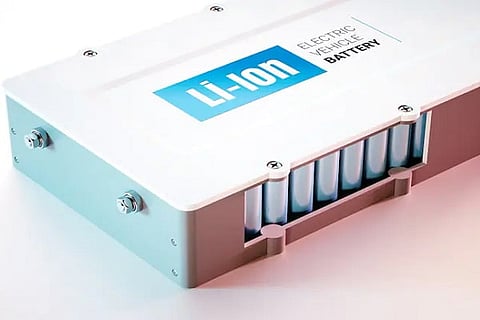
- News Updates
- PSU Watch
- Defence News
- Policy Watch
- हिन्दी न्यूज़
- Jobs Watch
- States News
- Event News

Mumbai: Investment in cell manufacturing in the country is expected to exceed USD 9 billion (around Rs 70,000 crore) by 2030 on the back of incremental demand from various applications and future growth prospects, a report said on Thursday. At the same time, the electric vehicle battery demand in the domestic market is estimated to touch around 15 GWh and around 60 GWh by 2030, credit ratings agency ICRA said in the report.
It noted that the battery manufacturing segment remains a critical cog in the overall EV ecosystem development and is garnering a lot of attention and added that achieving economies of scale in battery manufacturing will remain critical in lowering the cost of an EV and helping achieve pricing parity.
Additionally, given that the charging infrastructure penetration will only improve gradually, improvements in energy efficiency remain imperative, ICRA said.
According to the report, locating cell manufacturers close to the original equipment manufacturers (OEM) would allow for the creation of a research and innovation ecosystem, which would aid the development of batteries with improved energy efficiency and which are better suited to Indian climatic conditions, it said.
In EVs, advanced chemistry batteries remain the most critical and the costliest component, accounting for almost 35-40 percent of the vehicle price, as per Shamsher Dewan, Senior Vice President and Group Head for Corporate Ratings at ICRA.
At present, battery cells are not manufactured in India, and thus most OEMs rely on imports, and manufacturing operations in India are limited to the assembly of battery packs.
However, to achieve mass-scale penetration of EVs and a competitive cost structure, India will need to create its own ecosystem of developing battery cells locally, he said.
Multiple challenges exist on the road for the establishment of a cell manufacturing ecosystem, primary ones being technology complexity, high capital intensity and raw material availability, he said.
The ability of battery manufacturers to enter into agreements/alliances with players across the value chain to mitigate these risks, coupled with the creation of a robust framework for recycling would remain key, according to Dewan.
The electric vehicle (EV) segment saw a significant upturn in prospects in FY2022 owing to a host of factors including government support in the form of subsidies, as per ICRA.
It expects the EV penetration across automotive segments to grow exponentially over the next decade, with batteries remaining the most critical and costly component of an EV.
In addition to the robust demand from EV vehicles, the annual battery demand for stationary applications (grid storage, telecom towers, among others) is also likely to grow at a rapid pace and be substantial, ICRA said.
Given the incremental demand from various applications and future growth prospects (post 2030), ICRA estimates investments in cell manufacturing to exceed USD 9-billion, it said.
Given the need to invest in cell manufacturing units to keep pace with the expected surge in battery demand for both EV and stationary applications, numerous entities have already committed significant investments in this segment, the ratings agency said.
The Central Government recently signed agreements with three companies for incentives under its Production-Linked Incentive (PLI) Scheme for Advanced Chemistry Cell (ACC) Battery Storage, as per the report, which added that the policy emphasises on enhancing domestic value addition and is expected to support capability development in this sunrise.
(With PTI inputs)
(PSU Watch– India's Business News centre that places the spotlight on PSUs, Bureaucracy, Defence and Public Policy is now on Google News. Click here to follow. Also, join PSU Watch Channel in your Telegram. You may also follow us on Twitter here and stay updated.)
